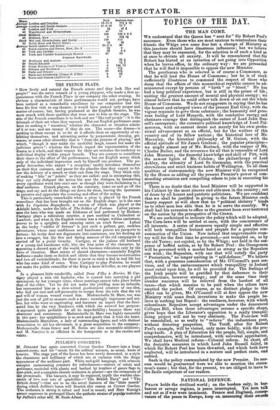THE FRENCH PLAYS.
" How lively and natural the French actors are! they look like real people!" was the naive remark of a young playgoer, who made a first ac- quaintance with the French Plays in our company the other evening. So obvious a characteristic of these performances would not, perhaps, have been noticed as a remarkable excellence by our companion had this been his first visit to any theatre; it would have seemed only proper and matter-of-course; but, having graduated at the English theatres, he was most struck with those qualities that were new to him on the stage. The aim of the French comedians is to look and act "like real people": it is the triumph of their art when they succeed. But our English performers seem bent on making a " sensation," whether the character or situation admits of it or not; and are uneasy if they do not. The scene—the drama—is nothing to them except in so far as it affords them an opportunity of ex- hibiting themselves, and attracting notice by preposterous dressing, gri- maces, or some other absurdity that is " from the purpose of playing," and which, " though it may make the unskilful laugh, cannot but make the judicious grieve": whereas the French regard the representation of the drama as a whole, and their respect for their art restrains the tendency to individual display within proper bounds. They are content to contribute their share to the effect of the performance; but our English actors think only of the individual impression each by himself can produce. The po- pular favourites, who expect " a reception," tacitly introduce themselves on their first entrance, and pause for the plaudits that they expect to fol- low the delivery of a speech or their exit from the stage. They think only of making " hits " or " points," as they are called; and in attempting this, they not only disfigure the action but mar the dialogue, by hammering every significant word into one's ears as though they were declaiming to a deaf audience. French players, on the contrary, come on and go off the stage, and say and do the things set down for them, leaving the spectators to perceive and appreciate the meaning and effect of the acting.
This is particularly remarkable when a piece is played by the French comedians that has been brought out on the English stage; as is the case 'with Le Capilaine Roqueftnette, a version of which was played at the ,.AAelphi lately, under the title of The Soldier of Fortune. Lafont person- *etas the hero who was made an Irishman of and performed by Hudson; -Cartigny plays a ridiculous courtier, a part confided to Cullenford or Lambert; and what in the English version was a vulgar, witless caricature, 'proves to be a sprightly and amusing satire on court favour. Lafont as the lucky "soldier of fortune" is just such a gallant, gay, reckless adventurer, whose easy confidence and handsome person are passports to fortune: his levity does not degenerate into coarseness, nor his dashing air into a swagger, but the free and daring manner of the old campaigner is carried off by a jovial vivacity. Cartigny, as the jealous old husband of a young and handsome wife, hits the true point of the character, by appearing a shrewd man of the world, who becomes ridiculous only by the force of situation. Most actors of absurd characters—especially English buffoons—make them so foolish and idiotic that they become monstrosities -and lose all verisimilitude; for there is never so utter a fool in real life but who has some kind of sense. Were Cartigny to play Polonius, he would not make the politic councillor of the King a mere driveller, as our players do.
In a pleasant little vaudeville, called Deux Files a Marier, M. Car- tigny played a rich old bachelor, who is coaxed into marrying a girl extempore, by her younger sister, whose marriage cannot take place before that of the elder. Yet he did not make the yielding man an imbecile, but represented him as a slow-witted goodnatured creature of one idea, who had not tact and self-possession to escape from the toils that the wit and will of woman wound round him. Mademoiselle St. Marc, too, was just the sort of girl to ensnare such a man : seemingly ingenuous and art- less, her wiles wore so captivating and innocent an aspect that she fasci- nated him by the very frankness with which she avowed her purpose: it appeared quite probable for all its improbability; because there was character and consistency. Mademoiselle St. Marc was highly successful in this part: her sprightliness is so arch and gentle that it wins the heart.
Mademoiselle Martelleur, a lady of commanding figure, and with distinct enunciation to aid her cleverness, is a great acquisition to the company:
Mademoiselle Anna Grave and M. Berou are also acceptable additions; and M. Narcisse is as efficient in the bourgeoisie as in the rustics and valets.


























 Previous page
Previous page